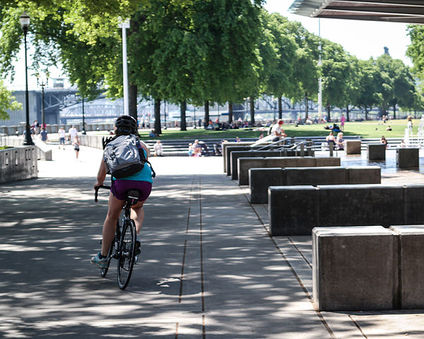|
Initiatives by topicCommunity involvementOpt In, Metro's online opinion panel. "Contribute your ideas about schools, housing, sustainability, parks, community centers, clean drinking water and more." Cycling activismBike sharing for all with Adaptive BiketownBiking has become a way of life in Portland and many other cities around the world. Riders enjoy reduced transit costs, health benefits, and social opportunities. In most cities, however, these benefits are only accessible for those who can ride traditional bikes, or the physically disabled who can afford special bikes. In Portland, riders lobbied the city government to think about disabled riders in designing a bike-sharing system. The city will eventually offer adaptive bikes for the physically disabled as part of the 1,000-bike and 100-station bike sharing system that launched in July 2016. The city first conducted a series of interviews with disabled riders to understand their needs. They found that, in addition to needing a variety of adaptive bikes, disabled riders often required storage options for wheelchairs and assistance at bike share stations. Adaptive bikes are designed to fit the needs of individual riders. Some are designed with three wheels to accommodate riders who have trouble balancing. Others are heavy duty to accommodate larger riders or offer hand pedals for riders with limited or no lower body mobility. During the interviews, officials discovered that disabled riders were looking to ride for exercise and recreation, so it is crucial to offer more adaptive bikes and services near trails, rather than at commuter bike stations. The adaptive bike program was scheduled to roll out in June, 2017. The city is holding or has held educational events, such as the adaptive bike clinic, and providing scholarships for biking classes, to ensure more people can enjoy the benefits of the forthcoming bike-sharing facilities. [2] Learn more from: Adaptive Bicycle Rental Pilot Project News story covering the policy Other linksPortlandWiki: Bicycling Wikipedia:
Environment qualityVerde, bridging the green divide Food activismKitchen appliances can be superfluous uses of money and cupboard space, especially for city residents with tight budgets and small homes. Yet interest in healthy eating is growing. More people are trying out unusual food preparation techniques, which can require unique appliances. Kitchen Share, launched in 2012, is a kitchen tool-lending library for home cooks in Portland, Oregon. It enables community members to borrow a wide variety of kitchen appliances such as dehydrators, mixers, and juicers. Members can check out over 400 items online using affordable lending library software from myTurn. With two locations in Portland, Kitchen Share helps residents save money, learn new skills from neighbors, and reduce their environmental footprint. As a nonprofit community resource for home cooks, Kitchen Share only asks for a one-time donation upon joining, providing affordable access to otherwise expensive and bulky items while building a more resource-efficient city. Learn about starting a lending library with this toolkit.—Marion Weymes [3] Other linksEat Here by Edible Portland - Farm My Yard Open spacesWikipedia:
Reduce, reuse, repair and recycleFree Geek, non-profit organization started in Portland, Oregon in 2000. Free Geek has two central goals: to reuse or recycle used computer equipment that might otherwise become hazardous waste, and to make computer technology more accessible to those who lack financial means or technical knowledge. Free Geek's refurbished computers are either granted to schools, churches, non-profit or community change organizations, given to volunteers, or sold in Free Geek's thrift store. W SharingMaps: Share Portland, OR Sustainable transport activismTriMet, public transit in the Portland Area Wikipedia:
Urban sustainabilityError in widget YouTube: Unable to load template 'wiki:YouTube'
City Repair, street painting examples Error in widget YouTube: Unable to load template 'wiki:YouTube'
Depave, asphalt and concrete removal from urban areas. Based in Portland, Oregon |
News and comment2017 The Future of Portland’s Skyline Is Made of Wood. Yes, Wood. Mar 20 [4] 2016 Portland votes to ban fossil fuel projects to fight climate change, Dec 15 [5] Portland is first U.S. city to make protection the default for all new bike lanes, January 28 [6] 2015 This Northwest City Just Passed The Strongest Resolution Against Fossil Fuels In The Country, November 13 [7] How an inspiring group of women built one of the greenest buildings in Portland, August 17 [8] Events2017 Apr 6 Transformation — A Celebration of Depave 2016 2014 May 23 - June 1 Village Building Convergence Resources
Apps for sustainabilityArts and culture: Public Art PDX, free app showcasing the rich and diverse collection of Public Art on display in and around Portland Sustainable transport: TriMet App Center Urban sustainability: Map App, City of Portland Error in widget YouTube: Unable to load template 'wiki:YouTube'
Community resources
Interwiki linksPortlandWiki, Portland's civic wiki Wikipedia: Portland, Oregon
|
